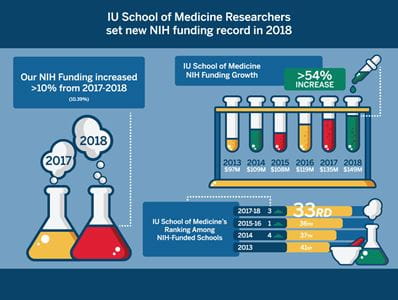INDIANAPOLIS — Indiana University School of Medicine scientists and physicians brought in nearly $150 million in research funding from the National Institutes of Health (NIH) in federal fiscal year 2018—a 10 percent increase over the previous year and a new record for the school.
This year’s funding levels maintain IU’s status among the top 33 out of 140 NIH-funded medical schools in the nation.
In the last five years, IU School of Medicine has grown its NIH research funding by more than 54 percent, or over $52 million. In calendar year 2018, the school brought in a total of more than $350 million in research funding from all sources, up from $316 million in 2017.
“The continued upward trend we’ve seen in our NIH and other research funding reflects the caliber of our faculty and the quality and impact of their research,” said Jay L. Hess, MD, PhD, MHSA, dean of IU School of Medicine and executive vice president for university clinical affairs at IU. “Building on our expertise in areas like neuroscience, cancer and children’s health, our researchers are advancing discoveries that improve health in Indiana and around the world.”
Some of the largest NIH grants to the school in 2018 funded Alzheimer’s disease research, including a five-year national research study led by IU School of Medicine’s Liana Apostolova, MD. The study seeks to understand who is at risk for early-onset Alzheimer’s and the progression of the disease, which strikes people younger than 65—often in their 40s and 50s.
Anantha Shekhar, MD, PhD, executive associate dean for research affairs at IU School of Medicine and associate vice president of research for university clinical affairs at IU, said the increase in NIH research funding can also be attributed to IU School of Medicine’s success in creating and enabling a more innovative and collaborative environment for researchers within the school, across the state and around the world.
In 2018, the Indiana Clinical and Translational Sciences Institute (CTSI), a statewide research partnership among IU, Purdue University and the University of Notre Dame, which is housed at IU School of Medicine, was awarded a $33 million NIH grant renewal to accelerate research from basic science to patient care. Through resources such as peer-to-peer review committees for grant applications, pilot funding programs and statewide clinical research infrastructure built with Indiana University Health, the Indiana CTSI helps IU School of Medicine researchers reach their scientific and career goals.
Other IU School of Medicine research highlights in 2018 included the FDA approval of two drugs made possible by faculty discoveries: one to treat patients with X-linked hypophosphatemic rickets, a painful and deforming bone disease, and another for familial transthyretin amyloidosis, which causes a buildup of amyloid that can eventually affect all organs in the body. IU School of Medicine launched two high-profile research centers, one for regenerative medicine and another for breast cancer, and made progress on the school-led IU Precision Health Grand Challenge, which aims to leverage precision health research to cure at least one cancer and one childhood disease. The school also expanded training and mentoring opportunities available to its faculty and added new research technology including the most powerful genome sequencing capabilities in the Midwest.
Shekhar said having a top-ranked, research-intensive medical school in Indiana, encompassing nine IU School of Medicine campuses throughout the state, not only benefits IU researchers. It also provides local residents with the latest innovations in medical treatment and patient care.
“We are proud to have one of the best medical research schools in the country right here in Indiana, where our faculty are successfully competing for research funding along with the top researchers in the nation,” Shekhar said. “This helps us in achieving our ultimate goal of speeding scientific discoveries that benefit Hoosiers and patients worldwide.”




